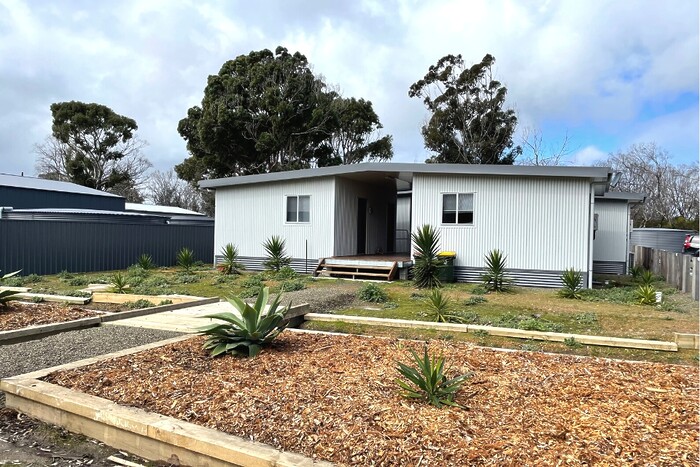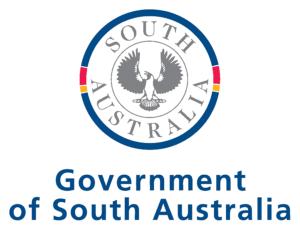Project snapshot
Alignment with RDA strategy
- Population growth
- Economic development
Alignment with RDA strategy
- Population growth
- Economic development
Finding solutions to accommodation shortages
A perfect storm of global and local issues has created significant housing and rental shortages, with Kangaroo Island being hit particularly hard. RDA AHFKI has been working with various stakeholders to provide short and long-term solutions to this issue.
During 2022 the national housing crisis continued to grow, with market pressures seeing a lack of affordable houses to purchase and short supply of rental stock. Further impacting stock levels in tourism regions has been volumes of long-term rental stock being repurposed into short-term accommodation, such as Airbnb.
On Kangaroo Island, these pressures, combined with the 2020 bushfires (which destroyed some 119 houses), has resulted in a domino effect impacting the capacity of businesses to employ staff due to a lack of housing for workers. In response, we have actively supported several housing projects on the island to increase workers and affordable housing stock.
After years of recognised housing issues on the island, RDA AHFKI:
- commissioned Hudson Howell to produce a solutions-focused Kangaroo Island Residential Accommodation Study
- engaged Junction Australia to deliver a pilot feasibility study to deliver ~20 homes on a Kingscote site
The feasibility study indicated a loss of $1.69m, establishing the need for an underwriter to deliver this project. Discussions are currently underway with Renewal SA to facilitate this role.
The Black Summer fires of 2019-20 largely affected the western end of the island, destroying 119 homes including rentals. This has left limited accommodation remaining to support recovery efforts. We have worked with businesses and stakeholders to support rebuilding and economic recovery efforts through the construction of affordable accommodation for workers.
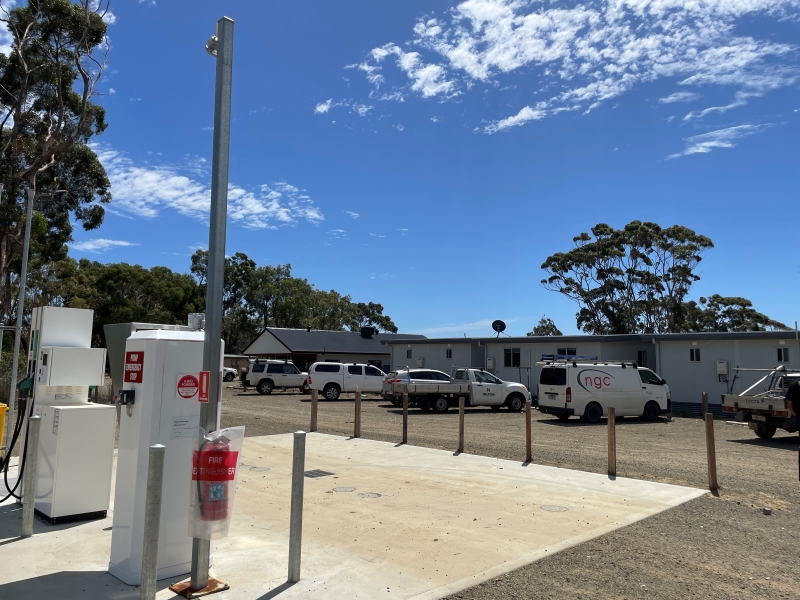
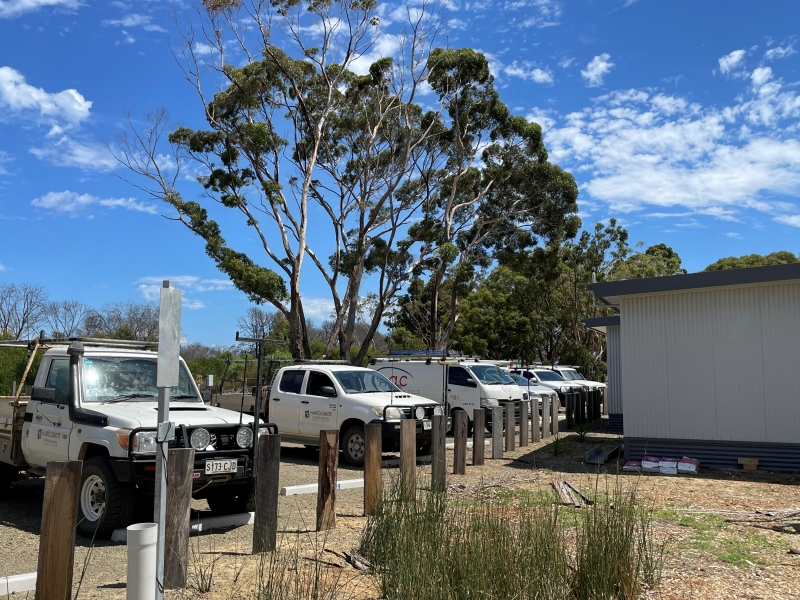
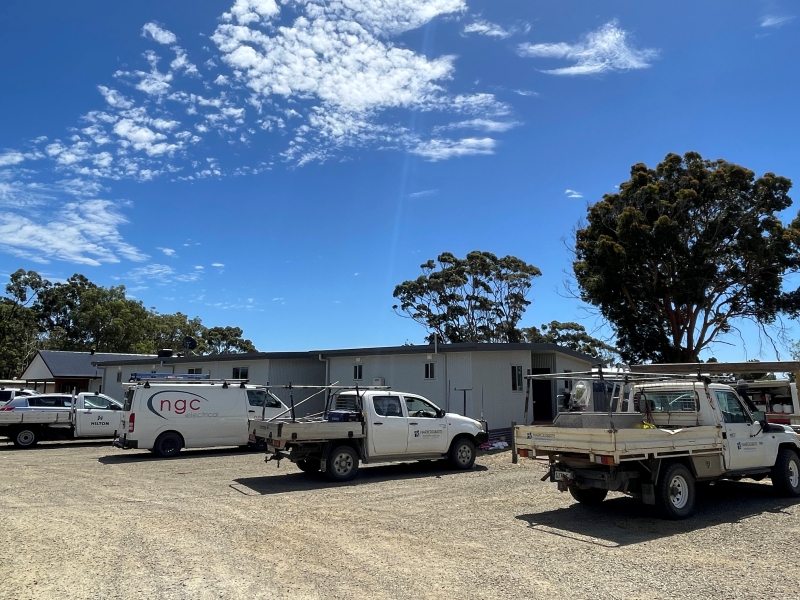
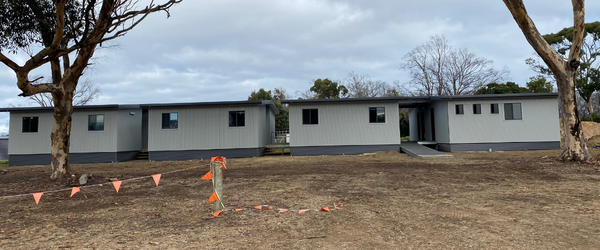
Western KI Caravan Park
Mark and Fiona Jago, owners of Western KI Caravan Park, offered land and project management to develop worker and group accommodation on their site. RDA AHFKI has helped to plan, secure funding partners and execute two worker accommodation projects which included:
- 10 ensuite workers’ rooms and a recreation room – project value: $1 million $0.7million funded by Business Council of Australia Foundation BizRebuild
- A 44 bed bunkhouse and a fuel outlet – project value: $1.5 million
$1 million funded by South Australian State and Commonwealth Government through the Local Economic Recovery Fund (LER)
Additionally, the Jago’s scaled up the rebuild of park facilities to include a commercial camp kitchen suitable for groups of up to 200 people to enable the park to become a community meeting place.
All projects are complete, and it is anticipated these will facilitate the resumption of economic activity throughout the western end of the island, including the rebuild of the Flinders Chase National Park infrastructure to house workers and enable visitation by groups of researchers, schools, and walking groups to return to the island.
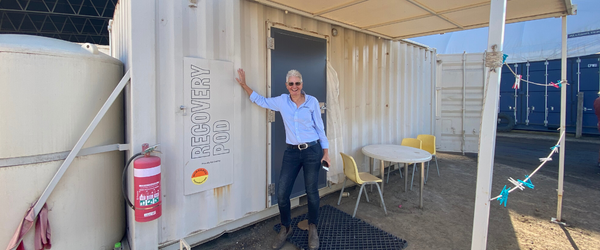
Locklands Pastoral
In October 2021, RDA AHFKI and Viterra sought and secured an amendment to Temporary Workers Accommodation Legislation to allow containerised housing, like Minderoo Pods, to be used as temporary seasonal workers accommodation.
The regulations remove the requirement to obtain planning consent in specified locations (building consent must still be obtained) allowing temporary accommodation to be established more quickly.
Locklands was registered as a designated site allowing Locklands Pastoral to accommodate staff and ensure continuous business operation.
Kangaroo Island Community Club (KICC)
Owners of the Parndana Hotel, KICC engaged in three housing projects to increase housing stock, retain locals, and attract people to the region. In October 2021, we recognised the group was struggling to progress projects due to impacts of COVID-19 on the building industry supply chain along with other development and planning issues.
We supported the KICC with strategy, planning, and execution of three projects:
1) Workers’ Accommodation
- Cabin style workers’ accommodation – project value: $1 million
Constructed within the Parndana Caravan Park adjoining the Parndana Hotel. $0.8 million funded by Local Economic Recovery Fund
Design is complete and Kuchel Building Contractors (local) have been engaged with completion due mid-2023.
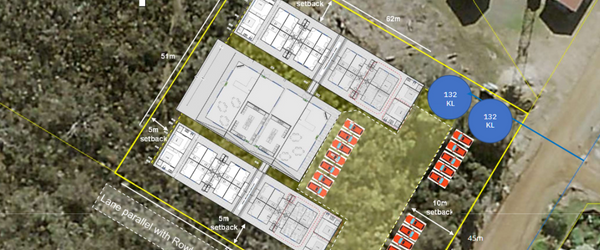
2) Potato Industry & Seasonal Workers’ Camp Parndana
- Construction of workers’ accommodation – project value: $1 million
To include up to 24 beds plus associated communal cooking, recreation and laundry facilities. $0.6 million in Black Summer Bushfire funding.
Land purchased, design complete and development application in progress.
Due to inflation and supply chain issues this element is now underfunded by $230,000, which is being sought through the National Emergency Management Agency and due for completion in 2023.
3) Parndana Land and Housing Development
In 2017, KICC determined that there was a lack of available land allotments within the township of Parndana. A working group was formed, and plans drafted to submit an unsolicited bid to Crown Lands (August 2018) for 8.7ha of land to accommodate 56 blocks, wetland, and open space. This bid was unsuccessful, however the intel has not been lost.
RDA AHFKI has engaged in discussions with KICC and has now progressed with stakeholders and a potential developer, with a view to Council submitting a bid to Crown Lands for a staged project of up to 40 homes for the Kiland forestry and agri families with an allocation available for community purchase.
RDA is progressing discussions with stakeholders for a staged development starting with 15 dwellings as a public/private partnership.
Media Coverage
Working with others to secure grant funding, they were able to build and extensive workers accommodation complex, including a bunkhouse kitchen, as well as a new office and fuel station.
27th July 2023 | Read more →More homes for regional South Australia
The Malinauskas Labor Government has unveiled a suite of measures to address housing shortages in regional South Australia – including support to house skilled workers to meet the needs of country towns.
16th February 2023 | Read more →Solving skills, housing crisis will deliver $44bn boost
In the past year there have been more than 36,200 job vacancies in country SA. But a dire shortage of homes, and employers begging for workers, means at least $44bn worth of projects are under threat unless drastic action is taken.
13th February 2023 | Read more →
